By: Ameen Hosain As stewards of passion for the outdoors and as people who experience nature to the fullest, anglers should have a great appreciation for what the sport of fly fishing has to offer.
The environments that fishermen rely on offer much beauty and are fragile ecosystems that have been around for many years before our time. These ecosystems are all valuable, and though most anglers treat them with respect, humans often have a large impacts on rivers and their surrounding wildlife areas- a lot of times the impact is unknown.
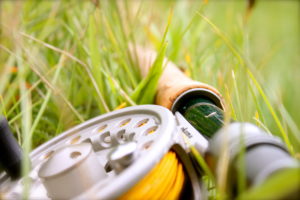
Conservation takes time and effort and can be done if a variety of ways. As anglers it is our duty to help maintain wildlife and habitat as much as possible, and there are many things we can do both on and off the river to ensure the health of our waters.
For example, some waters contain what are called Aquatic Nuisance species, or invasive species that can have a negative impact on waters they are found in. These species are not native to Colorado Waters and have no natural competitors or predators that can stop their migrations That's why it's up to humans to maintain these species and keep them from spreading to waters all over.
Something that contributes to the spread of these unwanted species is the large number of wading boots with felt soles. These boots help aid in traction on the slippery surfaces found in rivers. Felt is very absorbent and dries rather slowly, and can thus absorb and carry invasive species from river to river with the angler. It's recommended not to and in some states illegal to use felt bottomed wading boots, because of the possibility of spreading Aquatic Nuisance species to new healthy waters. On the contrary rubber soled boots reduce the impact anglers have on waters because they do not absorb water or hold invasive species.
To help keep waters invasive species free, it is always a good idea to spray down waders and let them dry completely in order to remove anything that may have stuck to them while wading. Colorado Parks and Wildlife has an Angler Cleaning card that offers suggestions on how to safely clean wading gear.
While fishing, anglers can do their part to protect the fish they so often seek by using barbless hooks, taking home any discarded tippet material,and properly releasing caught fish.
Barbed flies often wreak havoc on the inside of a fish’s mouth, and even when removed properly can cause lasting damage that alters a fish’s ability to eat and breath.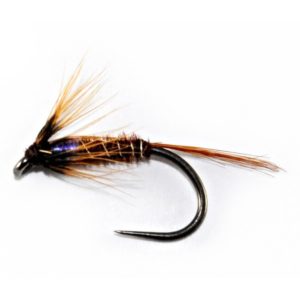 Barbless hooks offer almost harmless removal and are a better choice in any circumstance. If barbless flies are not available, barbs on hooks can be crimped down using a pair of small pliers- a simple yet effective way to make sure fish experience less harm when hooked.
Barbless hooks offer almost harmless removal and are a better choice in any circumstance. If barbless flies are not available, barbs on hooks can be crimped down using a pair of small pliers- a simple yet effective way to make sure fish experience less harm when hooked.
Tippet material is made of either monofilament or fluorocarbon, both of which are plastic materials and both of which take a very long time to decompose. Much like any other plastics, this material can be considered litter and any pieces no matter how small may have a negative impact on the environment. As an angler, one should carry a small bag to discard any leftover material, in order to reduce the amount of litter and unwanted plastics that get into water systems.
The most important part of ensuring a fish’s survival after being caught is the way in which it is released. Many anglers like to take photos as a way of documenting a day’s catch, however more often than not this requires a fish to be lifted out of the water for an extended period of time. Fish are exhausted after fighting an angler, and if left out of the water for even a short period following a fight, can have their chances of survival severely reduced.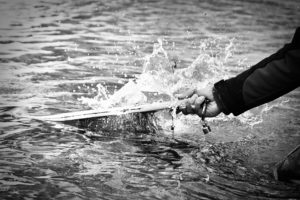 Thus it is best to keep a fish in the water as much as possible, with a photo being taken swiftly- holding the fish only a few inches above the water.
Thus it is best to keep a fish in the water as much as possible, with a photo being taken swiftly- holding the fish only a few inches above the water.
It is also essential that a fish be revived completely before allowing it to swim away. Face a fish upstream and hold it still, allowing water to flow through the gills of the fish. It is often assumed that moving a fish back and forth in the water allows it to breathe better. The opposite is actually true, as a fish is only able to breathe while moving forward, not backwards. A proper release is highly important in a fish’s ability to survive.






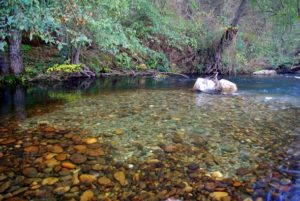 Locating trout redds can often be a difficult task, however
Locating trout redds can often be a difficult task, however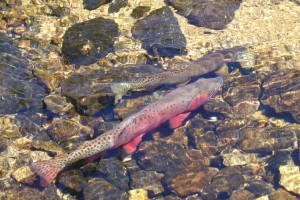 Choosing whether or not to fish to spawning trout is an issue that sees much debate, however with conservation in mind,
Choosing whether or not to fish to spawning trout is an issue that sees much debate, however with conservation in mind,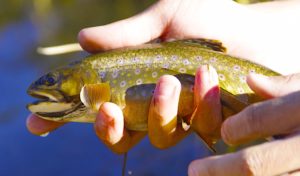 According to
According to 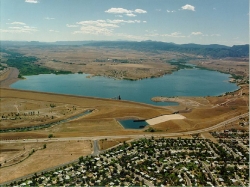 If not one who collects rainwater, another way to assist in the maintenance of healthy water levels is to pay close attention to sprinkler systems; making sure to turn off systems when it rains, and ensuring that they are only used a maximum of three times a week. These things are easy to do and are highly recommended by Denver Water in order to keep Colorado’s reservoirs in good shape.
If not one who collects rainwater, another way to assist in the maintenance of healthy water levels is to pay close attention to sprinkler systems; making sure to turn off systems when it rains, and ensuring that they are only used a maximum of three times a week. These things are easy to do and are highly recommended by Denver Water in order to keep Colorado’s reservoirs in good shape.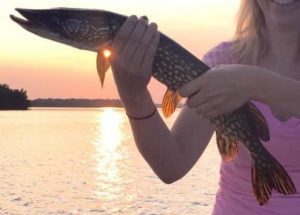 "Northern pike are aggressive predators with big appetites and if their population continues to grow in Green Mountain Reservoir, that will have profound impact on the fish we have stocked there, as well as potential impacts to the endangered native fish we are currently trying to recover," said CPW's Jon Ewert, aquatic biologist from Hot Sulphur Springs.
"Northern pike are aggressive predators with big appetites and if their population continues to grow in Green Mountain Reservoir, that will have profound impact on the fish we have stocked there, as well as potential impacts to the endangered native fish we are currently trying to recover," said CPW's Jon Ewert, aquatic biologist from Hot Sulphur Springs.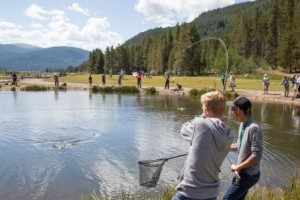
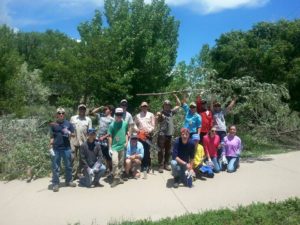
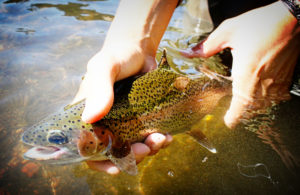
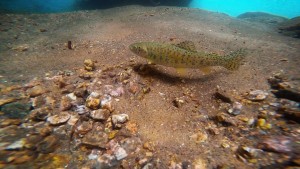 that would weaken the temperature standards that are supposed to protect trout streams throughout the state. The proposed changes brought forth by the Water Quality Control Division (WQCD) would put many trout fisheries at risk including during spawning periods.
that would weaken the temperature standards that are supposed to protect trout streams throughout the state. The proposed changes brought forth by the Water Quality Control Division (WQCD) would put many trout fisheries at risk including during spawning periods.
 Trout Unlimited is working to ensure that the temperatures of Colorado's streams remain at a healthy level for trout to survive. CTU has put together an
Trout Unlimited is working to ensure that the temperatures of Colorado's streams remain at a healthy level for trout to survive. CTU has put together an 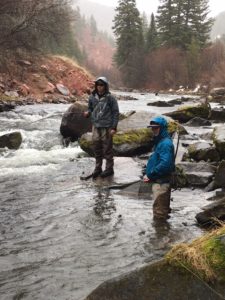 "It means a lot to me to be nominated as one top ambassadors in the Nation," said Muench. "I've easily put in a similar amount of time into the club as I have my final year of Engineering, I care a lot about the fly fishing club and it's amazing to realize that you're one of the best in the nation. No matter how much work I put in, I keep finding myself wondering if we could have done it better and what we've done wrong. It's just something else to have someone else say you're one of the best in the Country."
"It means a lot to me to be nominated as one top ambassadors in the Nation," said Muench. "I've easily put in a similar amount of time into the club as I have my final year of Engineering, I care a lot about the fly fishing club and it's amazing to realize that you're one of the best in the nation. No matter how much work I put in, I keep finding myself wondering if we could have done it better and what we've done wrong. It's just something else to have someone else say you're one of the best in the Country."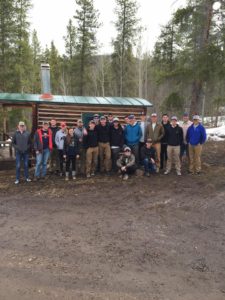
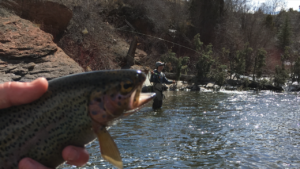 The success of the club doesn't stop there. David is hoping that the new president, Ryan Watson, will take the club even further and continue to expand, as well as have an improved focus on conservation.
The success of the club doesn't stop there. David is hoping that the new president, Ryan Watson, will take the club even further and continue to expand, as well as have an improved focus on conservation.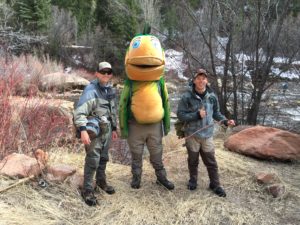 Being in the fraternity of a select few Costa Ambassadors, the role doesn't stop after graduation. Muench plans to continue to stay involved with TU and make a difference for Colorado's rivers and trout.
Being in the fraternity of a select few Costa Ambassadors, the role doesn't stop after graduation. Muench plans to continue to stay involved with TU and make a difference for Colorado's rivers and trout.
 “Just as our landscapes make Colorado a special place, the bipartisan bill creating an annual Public Lands Day demonstrates positive leadership at a time when politics is often too full of division,” said Suzanne O’Neill, Colorado Wildlife Federation executive director. “Public lands, from the mountains to the sagebrush steppe and rolling plains, support our fish and wildlife, hunting, fishing, wildlife watching, and other outdoor recreation that generates more than $34 billion in economic activity each year.”
“Just as our landscapes make Colorado a special place, the bipartisan bill creating an annual Public Lands Day demonstrates positive leadership at a time when politics is often too full of division,” said Suzanne O’Neill, Colorado Wildlife Federation executive director. “Public lands, from the mountains to the sagebrush steppe and rolling plains, support our fish and wildlife, hunting, fishing, wildlife watching, and other outdoor recreation that generates more than $34 billion in economic activity each year.”
